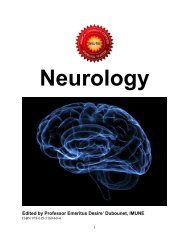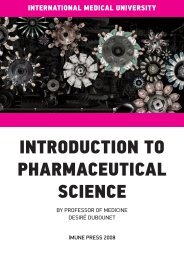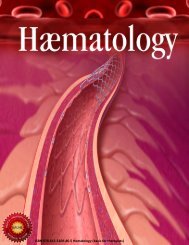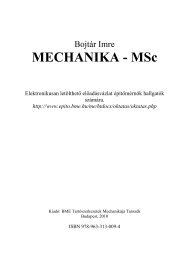You also want an ePaper? Increase the reach of your titles
YUMPU automatically turns print PDFs into web optimized ePapers that Google loves.
SODIUM MAXIMUM 1.5 grams of sodium or 3.8 2.3 grams of sodium or 5.8 grams of salt (just<br />
under a teaspoon of salt daily--almost a 1/2 teaspoon) daily. Most women get twice that.<br />
Excessive sodium intake can cause high blood pressure, a major risk factor for heart disease, stroke<br />
and kidney disease.<br />
CHLORIDE MAXIMUM 2.3 grams daily<br />
Although chloride isn't listed on Nutrition Facts panels, you can regulate your intake by watching<br />
how much sodium you consume and keeping your daily salt intake under a teaspoon.<br />
Salt is hidden in most foods for flavor. So most people are already getting to much please use salt<br />
substitutes like the Desi salt substitutes listed in this book.<br />
Calcium (Ca)<br />
The bones are a dynamic store of the calcium in the body. They are constantly under the influence<br />
of the hormone calcitonin, which promotes bone growth and decreases calcium levels in the<br />
blood, and parathyroid hormone, which does the opposite. Calcium is bound to the proteins in<br />
the bloodstream, so the level of calcium is related to the patient's nutrition as well as the calcium<br />
intake in the diet.<br />
Conditions of Calcium Imbalance<br />
Hypercalcemia (hyper= too much + calc=calcium + emia= in the blood) is associated with "moans,<br />
stones, abdominal groans"; symptoms include kidney stones, abdominal pain, and depression.<br />
Also, too much calcium can be associated with heart rhythm disturbances. Causes include<br />
parathyroid tumors, other tumors including breast cancer, excess amounts of Vitamin A or D,<br />
Paget's disease, and kidney failure.<br />
Hypocalcemia (hypo=too little) is usually associated with eating disorders or lack of parathyroid<br />
hormone. Symptoms include weakness, muscle spasms, and heart rhythm disturbance.<br />
Bicarbonate (HCO3)<br />
This electrolyte is an important component of the equation that keeps the acid-base status of the<br />
body in balance.<br />
Water + Carbon Dioxide = Bicarbonate + Hydrogen<br />
The lungs regulate the amount of carbon dioxide, and the kidneys work with HCO3. This electrolyte<br />
helps buffer the acids that build up in the body as normal byproducts of metabolism or when<br />
the body malfunctions and too much acid is produced (for example: diabetic ketoacidosis, renal<br />
tubular acidosis)<br />
Potassium<br />
Potassium is a very important mineral for the proper function of all cells, tissues, and organs in<br />
the human body. It is also an electrolyte, a substance that conducts electricity in the body, along<br />
with sodium, chloride, calcium, and magnesium. Potassium is crucial to heart function and plays a<br />
key role in skeletal and smooth muscle contraction, making it important for normal digestive and<br />
muscular function, too. Many foods contain potassium, including all meats, some types of fish<br />
(such as salmon, cod, and flounder), and many fruits, vegetables, and legumes. Dairy products are<br />
also good sources of potassium.<br />
Having too much potassium in the blood is called hyperkalemia; having too little is known as<br />
hypokalemia. Keeping the right potassium balance in the body depends on the amount of sodium<br />
and magnesium in the blood. Too much sodium -- common in Western diets that use a lot of salt<br />
-- may increase the need for potassium. Diarrhea, vomiting, excessive sweating, malnutrition,<br />
malabsorption syndromes (such as Crohn's disease) can also cause potassium deficiency, as well<br />
as use of a kind of heart medicine called loop diuretics.<br />
Most people get all of the potassium they need from a healthy diet rich in vegetables and<br />
fruits. Older people have a greater risk of hyperkalemia because our kidneys are less efficient at<br />
eliminating potassium as we age. Older people should be careful when taking medication that may<br />
affect potassium levels, such as nonsteroidal anti-inflammatory drugs (NSAIDs) and ACE inhibitors<br />
(see section on Interactions).<br />
Whatever your age, talk to your doctor before taking potassium supplements.<br />
Hyperkalemia (hyper=too much + kal=potassium + emia=in the blood) is a potentially lifethreatening<br />
situation because it causes abnormal electrical conduction in the heart and potentially<br />
life-threatening heart rhythm problems. High potassium levels are most often associated with<br />
kidney failure, in which potassium levels build up and cannot be excreted in the urine. Emergency<br />
dialysis is often required to remove the potassium.<br />
Hypokalemia (hypo=too little) is most often seen when the body loses too much potassium from<br />
causes like vomiting, diarrhea, sweating, and medications such as diuretics or laxatives. It is often<br />
seen in diabetic ketoacidosis, where potassium is excessively lost in the urine. Since chemicals in the<br />
body are related in their metabolism, low magnesium levels can be associated with hypokalemia.<br />
Research has been done on removing potassium from potatoes for hyperkalemia patients<br />
During early research in 1969, potatoes were sliced into 1/8th-inch slices or diced into small dicesize<br />
cubes and soaked in heated water (122 to 140° F) for two hours. The water volume was 10<br />
times more water than potatoes. Next, the potatoes were rinsed and boiled in five times more<br />
water for five minutes. This method of soaking and then boiling the potatoes reduced potassium<br />
from 400 milligrams per every 100 grams (equal to 2/3 cup) of potatoes to 211 milligrams for<br />
cubes and 90 milligrams for thinly sliced potatoes.<br />
Bone Health<br />
At least one study shows a positive link between a diet rich in potassium and bone health. More<br />
research is needed to determine whether a diet high in potassium can reduce bone turnover in<br />
people.<br />
Hypokalemia<br />
The most important use of potassium is to treat the symptoms of hypokalemia (low potassium),<br />
which include weakness, lack of energy, muscle cramps, stomach disturbances, an irregular<br />
heartbeat, and an abnormal EKG (electrocardiogram, a test that measures heart function).<br />
Hypokalemia is usually caused by the body losing too much potassium in the urine or intestines;<br />
it's rarely caused by a lack of potassium in the diet. Hypokalemia can be life-threatening and<br />
224 225

















